Off-grid solar inverter plays an important role in off-grid solar systems, which convert the electricity generated from solar systems into DC for home use. Unlike on-grid solar inverter, off-grid solar inverter works independently. In areas with no access to electricity, the off-grid inverter directly converts solar energy into electrical energy, and for nighttime use, batteries are used to store the excess electricity.

During cloudy weather or at night, you can use the energy from the batteries. At the same time, during the day, the off-grid inverter directly supplies electricity to your home appliances, saving you on your electricity cost.
Off-grade solar system is a sustainable and long-lasting system that depends entirely on solar panels and an off-grid solar inverter. It also gives you a complete opportunity to generate and consume electricity as per your requirements.
Key Features of Off-Grid Solar Inverter:
-
DC to AC conversion:
Off-grid solar inverters convert the DC generated by the solar panel into AC to standardize the electricity used in home appliances.
-
Battery Integration:
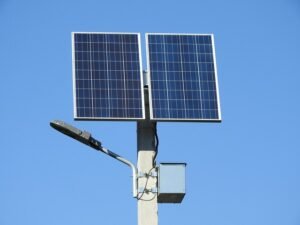
The off-grid solar system relies on storage batteries to provide electricity when solar energy is not available, such as at night or when there are clouds, and the batteries manage charging and discharging through an integrated system called a solar inverter.
-
Load Management:
Off-grid inverters are equipped with advanced load management capabilities to ensure that actual power demand does not exceed system capacity. They can prioritize essential loads, curtail unnecessary loads, and Manage peak power demand. The inverter automatically shuts down if the amperage exceeds or falls below a certain threshold.
-
Power Backup:
These systems use the off-grid inverter as a backup generator. It automatically shuts down in the event of a solar power outage or failure. This creates a continuous primary power source even during long periods of production. Some off-grid inverters can handle multiple power inputs including solar power, wind power, generator power hydroelectric power, etc. They work flexibly by setting up different types of renewable energy sources.
-
Monitoring and Control:
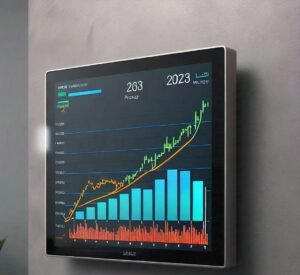
Monitoring and Control:
Modern off-grid inverters come with building metering systems that provide users with all the information about the production capacity, power, and storage in the batteries continuously on their mobile device, computer device, or any other electronic device.
Also, learn about:
Pros of Off-grid Solar Inverter:
-
Independence from the local grid system:
Off-grid solar inverters enable complete energy independence, making them ideal for remote locations where grid excess is not available or provide freedom from expensive grid electricity. As it can operate without a grid system.
-
Sustainability:
By using renewable energy sources, off-grid inverters help to reduce carbon overhead and promote environmental sustainability, and it is renewable energy. This electricity source does not cause any environmental pollution.
-
Energy Management:
This solar inverter provides complete energy management to users. Auto shut-down, re-start option and manage load of appliances. which helps in depleting the battery backup.
Cons of Off-grid Solar Inverter:
-
Initial Cost:

Off-grade solar systems including inverters can be more expensive to install than connected systems because the initial cost consists mainly of the battery storage system, solar inverter, solar panels, and other devices that smooth the primary current.
-
Maintenance:
The batteries used in these solar systems require regular maintenance and replacement after a while, which further increases costs. to meet the daily use of your electricity someone may need a big bank of batteries. so the cost of batteries varies from person to person on the base of their use.
-
Energy Management:
Consumers need to be conscious of their energy efficiency because your batteries provide as much backup as your solar panels can store. You have to constantly check the amount of current in your batteries during peak hours or when there are no clouds and how long you have to use it.
Application of Off-grid Solar Inverter:
-
Remote Homes and Cabins:
This inverter is widely used in rural areas and in remote homes where grid electricity is not available. It is used in areas where electricity supply is expensive, the off-grid system is installed in which the off-grid inverter is used.
-
Relief Camp:
This system is installed in areas where short-term accommodation is required, for example, a relief camp regarding to any disaster or where a company needs to provide electricity to its employees in a place where normal electricity is not available.
-
Telecommunication Towers:
Generally, telecommunication towers are located in places where grade electricity is not available. In such areas, the telecommunication tower requires continuous power to continue its service. is installed, which usually ensures the availability of electricity from sunlight or wind power.
Conclusion:
In conclusion, an off-grid solar inverter is a vital component for achieving energy independence. It is enough to provide a standard backup during the day, depending on the solar system you can put as much load as you want on it, any kind of load can be lit during the day time, for night time you need to install batteries with it so that the power supply continues without interruption, otherwise the system shuts down during cloud or night time.
Does the Off-Grid Solar inverter need batteries?
In sun life, an off-grid solar inverter gets power from solar panels converts it to AC, and provides it to home appliances, but if you want to use solar energy at night time, then battery backup is recommended.
How much electric load an off-grid inverter can produce?
Off-grid solar inverters are available in different power at markets, from 2KV to 25KV you can install them according to your usage.

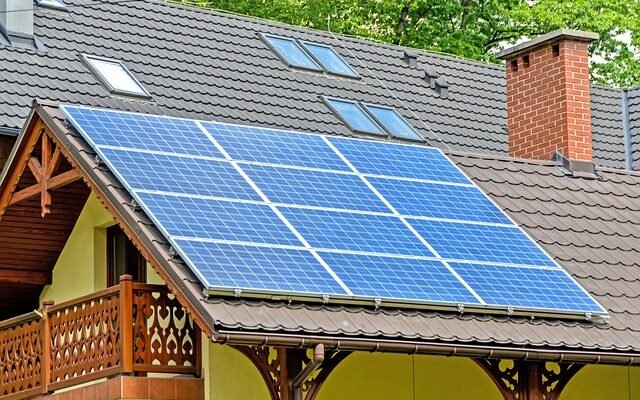
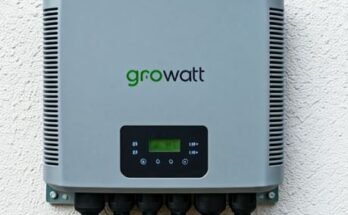
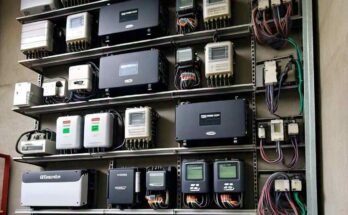
2 Comments on “Off-Grid Solar Inverter”